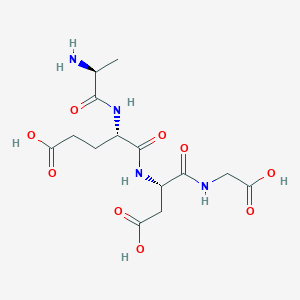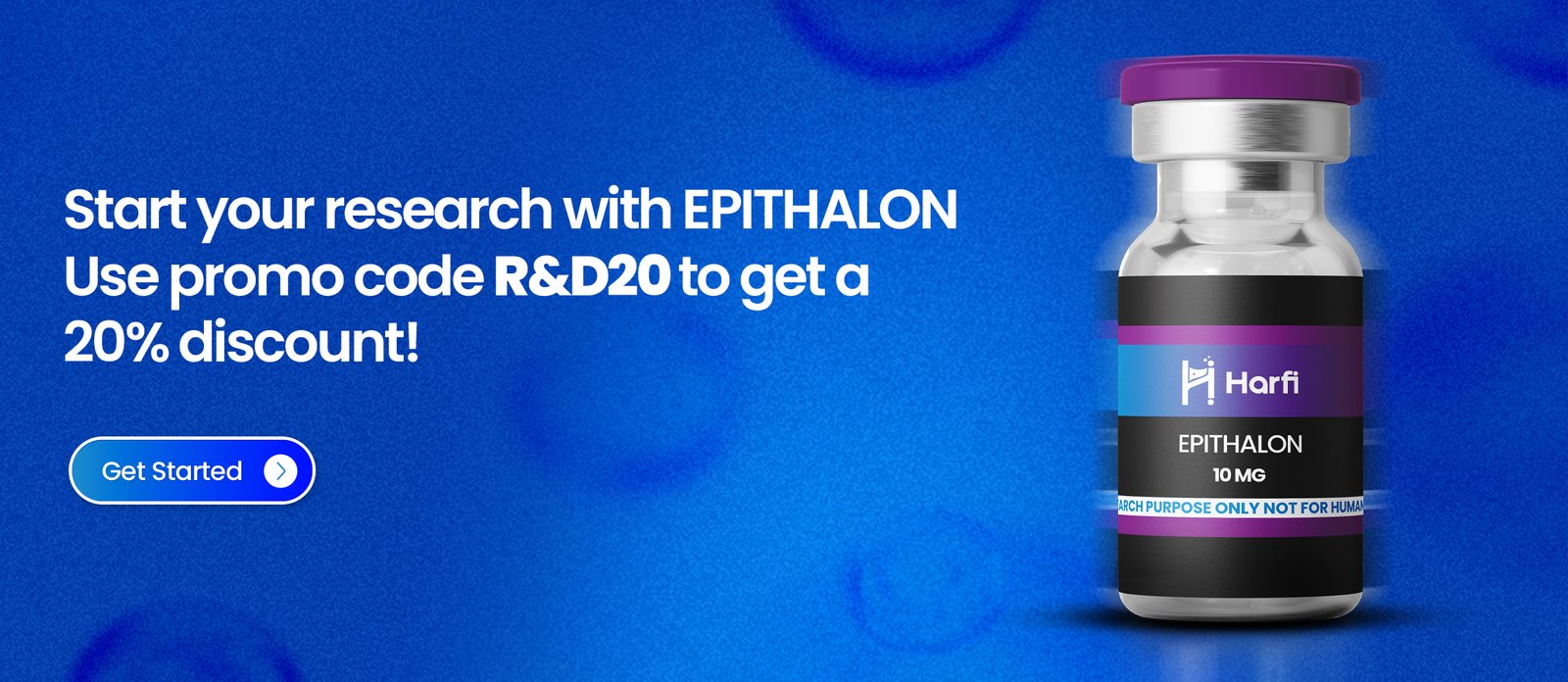Epithalon
Epithalon, also known as Epitalon, is a synthetic peptide derived from Epithalamin. Research suggests that it may play a role in regulating telomerase, the enzyme responsible for maintaining and extending telomeres—the protective caps at the ends of DNA strands. Studies indicate that Epithalon could stimulate telomere elongation, potentially supporting cellular health and combating signs of aging.
Product Usage
This product is intended for research purposes only. It is strictly designated for in vitro testing and laboratory experimentation. All information provided on this website is for educational purposes only. Any introduction into humans or animals is strictly prohibited by law. Only licensed, qualified professionals should handle this product. It is not a drug, food, or cosmetic and must not be misbranded, misused, or mislabeled as such.
Introduction
Epithalon, also known as Epitalon, Epithalone, or Epithalamin, is a short synthetic peptide recognized for its ability to activate telomerase and stimulate melatonin release. Originally developed in Russia in the 1980s, research suggests that Epithalon may delay age-related changes in the reproductive and immune systems while also extending lifespan in mice and rats. While primarily studied for its anti-aging potential, Epithalon has also shown promising effects in certain cancers, infectious diseases, and DNA regulation.
Structure
Sequence: Ala-Glu-Asp-Gly
Molecular Formula: C14H22N4O9
Molecular Weigh: 390.349 g/mol
PubChem CID:219042
CAS Number: 307297-39-8

Research: Exploring Epithalon’s Anti-Aging Potential
Early studies on insects and rodents highlight Epithalon’s remarkable ability to extend lifespan. Research shows a 52% reduction in mortality among healthy fruit flies and rats. In mice predisposed to heart disease and cancer, Epithalon extended lifespan by up to 27% compared to control groups. One of its key mechanisms is its ability to neutralize free radicals, which cause oxidative stress and damage healthy tissues.
However, Epithalon’s longevity benefits go beyond its antioxidant properties. Extensive in vitro studies on human somatic cells suggest that Epithalon activates telomerase, an enzyme that protects telomeres—the protective caps at the ends of chromosomes. This activation helps preserve DNA integrity, reducing strand errors that contribute to cellular dysfunction, aging, and disease. By shielding DNA from accumulated damage, Epithalon may play a crucial role in delaying age-related decline.
Epithalon and DNA Activation
Beyond its influence on free radicals and telomeres, Epithalon may regulate gene expression in ways that impact longevity. Scientists are exploring its ability to activate specific genes, particularly those involved in immune function and tissue repair.
Cellular studies reveal that Epithalon interacts with promoter regions of genes responsible for CD5, IL-2, MMP2, and Tram1. These genes play vital roles in:
- Immune response (CD5, IL-2)
- Maintaining the extracellular matrix in skin, tendons, and connective tissues (MMP2)
- Enhancing the body’s healing process
Additionally, research in rats suggests that Epithalon boosts interferon gamma expression in aging lymphocytes. Interferon gamma is essential for immune defense, activating macrophages, natural killer cells, and T cells to combat viral infections. This suggests that Epithalon may enhance immune resilience, particularly in aging individuals.
Epithalon: DNA Interactions and Potential Benefits
Confirmed DNA Interactions of Epithalon
Scientific research has identified several key genes influenced by Epithalon, highlighting its potential in cellular function and longevity:
- CD5 – Supports immune cell differentiation.
- IL-2 – Enhances IL-2 production, regulating white blood cells.
- MMP2 – Activates MMP2, reducing inflammation.
- Tram1 – Boosts protein synthesis.
- Arylalkylamine-N-acetyltransferase (AANAT) – Increases melatonin production.
- pCREB Transcription Protein – Regulates circadian rhythms and exhibits anti-neoplastic effects.
- Telomerase – Increases telomerase activity, promoting extended cell lifespan.
Epithalon and Skin Health
Epithalon has demonstrated a strong influence on MMP2, a protein critical for maintaining the extracellular matrix in connective tissues such as skin. Rodent studies suggest that Epithalon not only activates MMP2 but also stimulates fibroblasts, the cells responsible for producing collagen and elastin. Research indicates that mice exposed to Epithalon experience a 30-45% increase in fibroblast activation, leading to:
- Enhanced wound healing
- Improved skin elasticity and structure
- Slower age-related skin degradation
Additionally, Epithalon appears to regulate the PER1 protein gene, which is linked to circadian rhythm regulation and cancer progression. PER1 is often underexpressed in cancer patients, and its activation may enhance sensitivity to radiation therapy, potentially reducing required radiation doses and minimizing associated risks.
Epithalon and Melatonin Regulation
Melatonin plays a crucial role in sleep cycles and aging, with its production controlled by the pineal gland. Research suggests that Epithalon influences melatonin synthesis by regulating:
- AANAT – The enzyme essential for melatonin production.
- pCREB – A transcription protein involved in circadian rhythm control.
Studies on monkeys indicate that Epithalon restores melatonin secretion to normal levels, which may help regulate sleep patterns and promote overall well-being.
Epithalon and Visual Health
In studies on rats with retinitis pigmentosa, a degenerative eye disease, Epithalon improved visual outcomes in 90% of cases. The peptide appears to:
- Preserve retinal structure
- Enhance bioelectric function in the retina, which is crucial for vision
Research Use Only
Epithalon has demonstrated promising effects in preclinical studies; however, it remains strictly for educational and scientific research purposes. It is not intended for human consumption, and any use outside of research is prohibited by law. Only licensed researchers should purchase Epithalon for laboratory studies.
DISCLAIMER: FOR INFORMATIONAL AND EDUCATIONAL PURPOSES ONLY
All articles and product details provided on this website are strictly for informational and educational purposes.
The product information presented here applies solely to in-vitro studies—experiments conducted outside of living organisms, such as in laboratory settings. These products are not classified as medicines or drugs and have not been approved by the FDA for the prevention, treatment, or cure of any medical conditions, ailments, or diseases.

